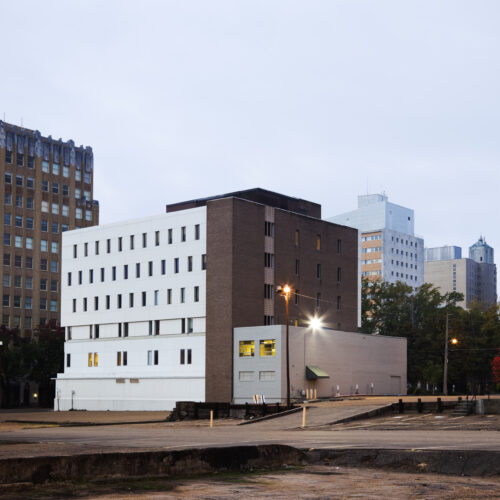Exploring the link between over-incarceration and a deficient right to counsel

Pleading the Sixth: A recent report by the PEW Center on the States concludes that states wasted $10 billion incarcerating people with little impact on public safety to show for the investment. The Sixth Amendment Center adds to the story by linking the long-standing right to counsel systemic deficiencies to the high cost of corrections, using Mississippi as the poster child.
“Prison populations rise and fall according to two principal forces: 1) how many offenders are admitted to prison, and 2) how long those offenders remain behind bars.” The statement comes from a June 2012 report by the PEW Center on the States, Time Served: The High Cost, Low Return of Longer Prison Terms, which concludes that the collective $10 billion spent by the states to incarcerate people for longer stays over the past two decades had little to no impact on public safety (prison terms increased by 36% from 1990 to 2009). Though the Sixth Amendment Center concurs that “there is little return on public dollars for locking up low-risk offenders for increasingly long periods of time and, in the case of certain non-violent offenders, there is little return on locking them up at all,” we believe that PEW overlooked one of the main contributors to over-incarceration – the failure to provide indigent defendants with adequate representation.
To make the case that systemic indigent defense deficiencies have a significant impact on the “principle forces” behind increased prison populations, we will show that broken indigent defense systems contribute to both the increase in numbers of people entering prison and the duration of their prison terms.
The link between over-incarceration & deficient indigent defense representation
According to a report by the United State Department of Justice, Bureau of Justice Statistics, 75% defendants are found guilty regardless of whether they retained or were appointed counsel. Even though “conviction rates for indigent defendants and those with their own lawyer” are “about the same,” the BJA report found that “those [defendants] represented by publicly financed attorneys were incarcerated at a higher rate than those defendants who paid for their own legal representation” (emphasis added), 71% compared to 54%.
To clarify, the Sixth Amendment Center believes that adequate indigent defense systems are often tarnished by such overly broad conclusions. There is a difference in representation provided by well-trained attorneys, whose qualifications match the complexity of the cases handled, whose workload is controlled, who are supervised and who are not unduly influenced by politics or the judiciary versus the representation provided by unqualified, untrained, attorneys who accept an unlimited number of cases in order to please the judge presiding over his cases thus causing a financial disincentive to do as little work on cases as possible. The difference is between systems that meet the American Bar Association’s Ten Principles of a Public Defense Delivery System and those that do not. As reported here, the Sixth Amendment Center estimates that more than 64% of the counties in this country operate “non-systems” in providing indigent defense services. We believe the BJA conclusions regarding a higher incarceration rate for those with publicly paid attorneys reflects the fact that the majority of right to counsel models in this country do not meet the ABA Ten Principles. (If a study were funded to compare representation provided by “systems meeting the ABA Ten Principles” versus “non-systems,” we theorize that the results would show that defendants provided representation via “systems meeting the ABA Principles” would have incarceration rates similar to privately retained attorneys or better.)
The same holds true when reaching conclusions about the length of sentences of those defendants invoking their Sixth Amendment right to an attorney. For example, a 2009 report by the Michigan State Appellate Defender (SADO), Penny-wise, Pound Foolish: Waste in Michigan Public Defense Spending, presented to the United States House of Representatives, Committee on the Judiciary, demonstrates clearly that the failure of public counsel to adequately advocate at the sentencing phase is both a hallmark of non-systems’ ineffectiveness and raises serious questions about the cost-effectiveness of the criminal justice process. Michigan is a tale of two indigent defense structures. SADO is a “system” that meets the ABA Ten Principles. Trial-level services, however, is a “non-system” that has been described here by a blue-ribbon, bi-partisan committee as an “uncoordinated, 83-county patchwork quilt” that “lacks the procedural safeguards to ensure effective public criminal defense services.” According to the SADO report, because sentencing in Michigan is “complex and highly-specialized,” and because trial attorneys are “ill-prepared,” they “have virtually no time to check the accuracy” of sentencing reports, and they have caseloads too large to allow them adequate time to investigate “circumstances that might mitigate the severity of the punishment,” appellate attorneys secure sentencing relief for their clients “an average of 85% of the time.” SADO estimates that its attorneys save the state nearly $1 million per year correcting sentences imposed and accepted by lawyers in the state’s trial-level “non-system.” And, because SADO only represents about a quarter of all eligible indigent defense appellate clients, the report estimates that the state could have saved nearly $70 million dollars over a five-year period if they handle all indigent defense direct appeals.
Other reports make similar claims about the impact of non-systems. A 2004 report by Emory University professors determined that public defense attorneys “achieved poorer outcomes than their privately retained counterparts, measured by the actual sentences defendants received.” A 2011 report by University of Texas at San Antonio and Arizona State University professors found that “[f]or white defendants, having a private lawyer makes it 2.7 times more likely that they will get bail. And black defendants with a private lawyer are twice as likely to get the original charge reduced.” (Note: report is only available for purchase.)
Finally, the PEW report acknowledges that decisions about how to charge defendants can have a “profound impact” on the number of people entering correctional facilities and the length of time spent under state supervision. But the failure of many systems to provide attorneys whatsoever to individuals facing criminal prosecutions that carry potential jail time – in direct violation of U.S. Supreme Court case law – means that the critical step of requiring the prosecution’s case to survive the crucible of meaningful adversarial testing is non-existent, resulting in more and more non-violent people entering into state supervision programs. In other words, the “profound impact” of prosecutors’ charging decisions on the overwhelming scale of our corrections systems is compounded where there is no attorney at all present in the courtroom to challenge the state.
As noted in the seminal report by the National Association of Criminal Defense Lawyers, Minor Crimes, Massive Wastes: The Terrible Toll of America’s Broken Misdemeanor Courts, state criminal justice systems use a variety of ways to get around the Sixth Amendment mandate to provide lawyers to poor people facing the possibility of incarceration, including uninformed waivers of counsel (defendants being told they can get out of jail sooner if they do not invoke their right to a lawyer), stringent eligibility requirements (e.g., rules that deny attorneys to those posting bail, thus creating an incentive to stay in jail pre-trial at tax-payers expense), and/or requiring the defendant to confer with a prosecutor prior to getting a lawyer.
Without a qualified attorney with the time and resources to properly investigate and challenge the prosecution, such practices allows our criminal justice systems to become nothing more than assembly lines for processing people into prison. Or, as Kentucky Public Advocate Ed Monahan states in the NACDL report, “[t]he dirty little secret of the criminal justice system is that most eligible people do not get defenders.”
A Detailed Look at a Non-Systems’ Impact on Over-incarceration: The Mississippi Example
To demonstrate how this all plays out, we turn to Mississippi. The right to effective assistance of counsel in Mississippi is unequivocal. Miss. Code Ann. § 25-32-9(1) requires that “any person … arrested and charged with a felony, a misdemeanor or an act of delinquency,” shall be afforded the opportunity to sign an affidavit of indigency and be appointed a public defender. The indigent accused is furthermore statutorily entitled to have “representation available at every critical stage of the proceedings against him (emphasis added) where a substantial right may be affected.” Miss. Code Ann. § 25-32-9(2) Sub-section (3) of the same statute goes on to make clear that the right to counsel extends to all courts of limited jurisdiction, noting that “[n]o person determined to be an indigent … shall be imprisoned as a result of a misdemeanor conviction unless he was represented by the public defender or waived the right to counsel.”
To ensure a meaningful right to counsel, Mississippi is one of the few jurisdictions in the United States that offers pay parity for public defenders and prosecutors. Miss. Code Ann. § 25-32-5 states that the compensation for a full-time public defender representing an entire circuit court district shall not be less than the compensation of the district attorney. Parity also extends to operating costs: the “public defender shall be provided with office space, secretarial assistance, and all reasonable expenses of operating the office, at least equal to or more than the county prosecuting attorney, or the district attorney if the public defender represents the entire circuit court district.” Miss. Code Ann. § 25-32-7
However, the reality of being a poor person accused of crime in Mississippi differs dramatically from these lofty statutory promises. Mississippi is one of only eight states that do not contribute any money for non-capital, trial-level right to counsel services (the others are: Arizona, California, Idaho, Michigan, Pennsylvania, South Dakota and Utah). This means that local government must shoulder the entire burden of providing public attorneys to poor defendants. And, unlike many states where municipal courts only hear local ordinance violations, Mississippi’s 246 municipal courts adjudicate misdemeanors and hold preliminary hearings on felonies making cities and towns a primary funder of right to counsel services.
Despite this responsibility, local governments have significant revenue-raising restrictions placed on them by the state while being statutorily prohibited from deficit spending. There are three revenue sources available to local government (real estate taxes; fees for permits/services; and, assessments on ordinance violations, traffic infractions and criminal convictions). But, because the state of Mississippi has imposed the lowest tax burden of any of the 50 states, local governments must rely more heavily on unpredictable revenue streams, such as court fees and assessments, to pay for their criminal justice priorities than similarly situated jurisdictions in other states. The financial situation was further compounded in the wake of Hurricane Katrina in 2005. Property tax revenue plummeted in the aftermath of the storm, as thousands of homes were taxed as slabs.
This creates a serious competition for limited local dollars. For example, Mississippi residents suffer from the highest rate of obesity in the country. This puts a fiscal strain on local medical infrastructure that might otherwise go to education or social services that could help route disadvantaged people away from criminal activity and toward more positive community behavior. Perhaps not coincidently, Mississippi has the second lowest percentage of citizens aged 25 and older with high school diplomas (only 80.4% graduate).
The chance of indigent defense rising to the top of local spending triage lists is further compounded by the overwhelming demand for public defense services. By almost any standard, Mississippi is the poorest state in the nation. The state has the greatest percentage of citizens living below the poverty rate (21.9%), the lowest gross domestic product per capita ($24,293), and the lowest median family income ($37,881). It is tied for 43rd in unemployment. Given the state’s high unemployment level, widespread poverty, limited education and poor health, almost every single person facing a loss of liberty in criminal or delinquency proceedings would likely qualify for representation by a public lawyer, though there is currently no state agency to track such information.
High demand and limited resources have forced local governments to forego the full-time public defender model in favor of cheaper options. Only four of 82 counties (or, less than 5%) and zero of the 289 municipalities (0%) have created full-time public defender offices. This means that the “parity” statutes simply have no bearing on the vast majority of the state. Instead, when a person is charged with a jailable offense, it is the responsibility of the judge to appoint an attorney (judges in misdemeanor courts do not have to be lawyers, and are appointed by local mayors or aldermen). There are no statutory attorney qualification standards beyond that the lawyer must reside in the county. In municipal court cases, public attorney compensation payment cannot exceed $200 per case — whether or not the case goes to trial. This produces a financial disincentive for an attorney to do anything beyond trying to dispose of the case as quickly as possible. Similar hard caps are statutorily in place for felonies ($1,000) and capital cases ($2,000).
But even these stringent compensation caps have proven to be too expensive for local jurisdictions. As opposed to paying an attorney a single flat fee for each case, many counties and municipalities have now moved to a flat fee contract system in which a private attorney will take an unlimited number of cases for a single flat rate. Not surprisingly, Mississippi has consistently ranked in the bottom five of the 50 states for indigent defense cost per capita over the past twenty years. Indeed, a series of three reports conducted by The Spangenberg Group (TSG) in the 1990’s on behalf of the Mississippi State Bar Association under the auspices of the American Bar Association (ABA) Bar Information Project showed a steady and increasing trend toward flat fee contracting. However, since there is no state agency tracking how indigent defense services are provided at the local level, in truth, no one can say with certainty the extent to which flat fee contracting has proliferated over the last decade.
What we do know is the impact flat fee contracting has on indigent clients. In 2003, the National Association for the Advancement of Colored People, Legal Defense & Education Fund, Inc., (LDF) published Assembly-Line Justice: Mississippi’s Indigent Defense Crisis. The LDF report documented, among other findings, that: a) many people charged with non-violent crimes spend more time in jail pre-trial than they spend serving their eventual sentence; b) children charged with crimes as adults wait months to even speak with a lawyer; c) some counties make defendants wait a full year before their first conversations with their lawyers; d) lawyers lack basic funds for trial-related expenses; e) hundreds of juveniles each year are represented by lawyers who do not file motions, interview witnesses, or challenge the state’s evidence in any way; and, f) some counties routinely send defendants that are unable to pay the cost of their public representation to jail after perfunctory probation revocation hearings at which the defendant has no representation.
Is it any wonder that Mississippi now ranks second in the nation for percentage of population in either jail or prison, behind only Louisiana?
Conclusion
Without the aid of an effective lawyer, almost anyone stands the risk of being incarcerated when charged with a crime. The majority of us would not know, for example, what is and is not admissible in a court of law, let alone how to procedurally convince twelve jurors that we are innocent. If this is true of even the most affluent and educated among us, is it then fair to let someone who has fallen on hard times or has been let down by our country’s educational system or is not yet an adult face a loss of liberty at the hands of government simply because she lacks the guiding hand of counsel to navigate the complexities of our legal system?
The PEW report states that “criminologists and policy makers increasingly agree that we have reached a ‘tipping point’ with incarceration, where additional imprisonment will have little if any effect on crime.” Given that PEW also reports that “[a]nnual state spending on corrections now tops $51 billion,” the country must face the fact that we can no longer afford the criminal justice system we have. And, though alternative approaches are clearly needed, including those advocated in the PEW report (sentencing reform, rolling back mandatory-minimums, and reclassifying non-violent crimes to infractions, among others), such reform movements must also include creating indigent defense systems that meet the ABA Ten Principles.


